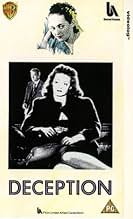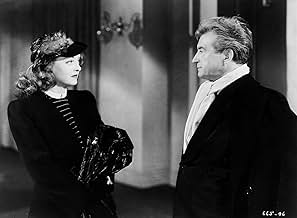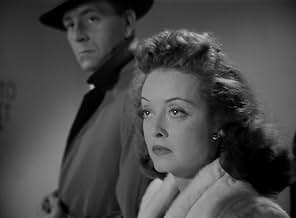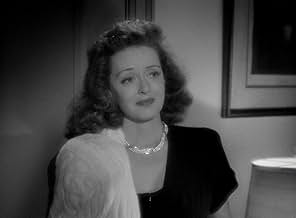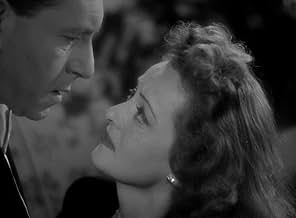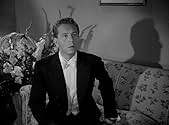IMDb-BEWERTUNG
7,1/10
4493
IHRE BEWERTUNG
Füge eine Handlung in deiner Sprache hinzuAfter marrying her long-lost love, a musician finds the relationship threatened by a wealthy composer who is besotted with her.After marrying her long-lost love, a musician finds the relationship threatened by a wealthy composer who is besotted with her.After marrying her long-lost love, a musician finds the relationship threatened by a wealthy composer who is besotted with her.
- Regie
- Drehbuch
- Hauptbesetzung
- Auszeichnungen
- 4 wins total
John Alban
- Concertgoer
- (Nicht genannt)
Russell Arms
- Music Student
- (Nicht genannt)
Lois Austin
- Norma - Wedding Guest
- (Nicht genannt)
Patricia Barry
- Music Student
- (Nicht genannt)
Brandon Beach
- Concertgoer
- (Nicht genannt)
Lulu Mae Bohrman
- Restaurant Diner
- (Nicht genannt)
Paul Bradley
- Concertgoer
- (Nicht genannt)
James Carlisle
- Restaurant Diner
- (Nicht genannt)
Gertrude Carr
- Wedding Guest
- (Nicht genannt)
James Conaty
- Well-Wisher at Concert
- (Nicht genannt)
Marcelle Corday
- Hat Check Woman
- (Nicht genannt)
Gino Corrado
- Waiter
- (Nicht genannt)
Suzi Crandall
- Music Student
- (Nicht genannt)
Empfohlene Bewertungen
Deception (1946)
A marvelous chamber piece, in a way, involving orchestral music. The cast begins with two principals, played with usual intensity by Bette Davis and with usual restraint by Paul Henreid. This broods a bit and suggests trouble, and then comes the third player, who outdoes them both, in the form of Claude Rains. The rest of the movie is an interplay between the three, a push and pull and game of dodging and, of course, deception.
So how to judge this kind of tightly woven enterprise? It feels as though William Wyler could have directed it, so polished and rich it all is. But this is a Warner Brothers drama, so there is another kind of layer of dark danger, and of a noir inspired lighting and camera-work. This visual aspect, in a way, is the real star of the film, which says a lot, considering the high level of acting involved.
In all it's purely an entertainment, but at the highest level. The backdrop of classic music and classical musicians hasn't worn well over the years, but I grew up with this kind of scene and it brought back a lot of those vibes. A terrific movie within its own genre.
A marvelous chamber piece, in a way, involving orchestral music. The cast begins with two principals, played with usual intensity by Bette Davis and with usual restraint by Paul Henreid. This broods a bit and suggests trouble, and then comes the third player, who outdoes them both, in the form of Claude Rains. The rest of the movie is an interplay between the three, a push and pull and game of dodging and, of course, deception.
So how to judge this kind of tightly woven enterprise? It feels as though William Wyler could have directed it, so polished and rich it all is. But this is a Warner Brothers drama, so there is another kind of layer of dark danger, and of a noir inspired lighting and camera-work. This visual aspect, in a way, is the real star of the film, which says a lot, considering the high level of acting involved.
In all it's purely an entertainment, but at the highest level. The backdrop of classic music and classical musicians hasn't worn well over the years, but I grew up with this kind of scene and it brought back a lot of those vibes. A terrific movie within its own genre.
How did I never come across Deception (1946) before? It's got to be Claude Rains' most delicious role. He absolutely has a blast playing the grand, tyrannical, jealous composer who hates giving Bette up to Paul Henreid, her former lover who has just returned from Europe at the end of the war. Both men are wickedly jealous of each other. The scene where the great composer unexpectedly arrives at Bette's and Paul's festive wedding party at her great loft apartment overlooking the river in New York (modeled on Leonard Bernstein's apartment) and trades poisonous banter with Bette and Paul makes the movie worth it by itself. But every scene is a gem, such as the scene where Claude takes them to a haute cuisine French restaurant and spends 10 minutes going back and forth over whether to order pheasant, trout, or saddle of lamb and whether to go with a Hermitage or a Vosne Romanee wine. This is some of the sharpest, wittiest dialogue I've seen in a movie, rivaling Ernst Lubitsch and every bit as good as in All About Eve. Oh, and I forgot to mention the amazingly good symphony performance scenes, with an original cello concerto by Korngold, ("played" by Henreid with the arms of two real cellists reaching in from either side to play the instrument). And Bette, a trained pianist, playing Beethoven at her wedding party (she really wanted to play it herself but Jack Warner decided against it but you can see she knows what she's doing in fingering the keys). If you haven't seen it, do check it out.
...Of Claude Rains' character in this picture. As has been stated, he is an older guy who loses out on Bette Davis to a younger guy. The younger guy is Paul Henreid playing a WWII survivor, thought dead by Davis. When she spots him at a concert in NYC years later, the handwriting is on the wall for Rains.
The mise en scene is the world of classical music, about which I know little but which sounds, uh, classical in several pieces played during the film. Henreid plays a cellist, so the pieces for the cello leave me out completely. Rains is a master composer, a genius referred to by his last name, Hollenius, thereby cementing his genius label. Not only is he a genius, he is a vengeful genius.
One does not often encounter such a high level of acting as that found in "Deception", and it elevates the film above the ordinary. All three principals are outstanding, especially Rains, whose performance towers over the other two. It is a character study and a straight drama. Speaking for myself I was not aware of any elements of 'noir', but if you are a fan of good acting, "Deception" is for you, as it is exceptional in this department.
The mise en scene is the world of classical music, about which I know little but which sounds, uh, classical in several pieces played during the film. Henreid plays a cellist, so the pieces for the cello leave me out completely. Rains is a master composer, a genius referred to by his last name, Hollenius, thereby cementing his genius label. Not only is he a genius, he is a vengeful genius.
One does not often encounter such a high level of acting as that found in "Deception", and it elevates the film above the ordinary. All three principals are outstanding, especially Rains, whose performance towers over the other two. It is a character study and a straight drama. Speaking for myself I was not aware of any elements of 'noir', but if you are a fan of good acting, "Deception" is for you, as it is exceptional in this department.
I'll dispense with the details of the plot and move directly to Mr. Rains' performance as Hollenius the composer in this musico-melodrama.
This is his show although Davis and Henreid attempt to hold their own in this film.
His flair for manipulation and deception, hence the title, dominates the film.
He does a great job of it, driving everyone crazy with his shenanigans and jealousy.
The cinematography is well done and the story's setting in the world of post-WW II classical/modern music is interesting.
I noted that early on, for instance, as Henreid finished a performance, audience members asked him who his favorite living composer was..."Sibelius...or Shostakovich...?" No mention of Aaron Copland or the many other composers alive at the time.
Hollenius' work as a composer was a curious mix of tonal, traditional and slightly atonal influences, attempting to display "modern" music but watered down to keep the audience and us interested.
The mimicking of the piano and cello performances by all three actors was fairly well done.
I found it quite interesting too that both Davis and Rains were not "starving artists" like Henreid. Opulent apartments and lifestyles for piano teachers and composers were not common, but these two were well-off in an even garish sense.
This was not the reality of the time in the music world.
I'd recommend this film if you're a Rains or Davis fan. Henreid was not used for his full potential.
This is his show although Davis and Henreid attempt to hold their own in this film.
His flair for manipulation and deception, hence the title, dominates the film.
He does a great job of it, driving everyone crazy with his shenanigans and jealousy.
The cinematography is well done and the story's setting in the world of post-WW II classical/modern music is interesting.
I noted that early on, for instance, as Henreid finished a performance, audience members asked him who his favorite living composer was..."Sibelius...or Shostakovich...?" No mention of Aaron Copland or the many other composers alive at the time.
Hollenius' work as a composer was a curious mix of tonal, traditional and slightly atonal influences, attempting to display "modern" music but watered down to keep the audience and us interested.
The mimicking of the piano and cello performances by all three actors was fairly well done.
I found it quite interesting too that both Davis and Rains were not "starving artists" like Henreid. Opulent apartments and lifestyles for piano teachers and composers were not common, but these two were well-off in an even garish sense.
This was not the reality of the time in the music world.
I'd recommend this film if you're a Rains or Davis fan. Henreid was not used for his full potential.
I have just finished reading all of the comments here and now let me add my two cents worth. This is my all time favorite Davis opus and it is certainly not because of the high quality of her performance. See Davis at her best in The Letter. What Deception is is a high powered duel between flamboyant personalities (Davis and Rains) wiping their costar (Henreid) right off the screen. The restaurant scene deserves all the mention it got here previously, but how about mink coated Bette confronting Rains in his bed reading Dick Tracy? The screen crackles with vitriol. This is over the top screen acting at it's most enjoyable.If you've never seen this, take the opportunity and enjoy it for what it is: good old fashioned Hollywood entertainment.
Wusstest du schon
- WissenswertesPaul Henreid could not play the cello. While he was able to fake it in the long shots, to achieve the illusion in closeup, he wore a special jacket with no sleeves and holes for two real cellists to insert their arms - one to bow, and one to accurately finger the music - while seated behind him, out of shot.
- PatzerWhile Christine, alone in her studio, is talking to Alexander Hollenius on the telephone, the highly visible shadow of a crew member is moving back and forth across the piano behind her.
- Zitate
Alexander Hollenius: [snatches his bleeding hand away from Christine] Like all women - white as a sheet at the sight of a couple of scratches... calm and smiling like a hospital nurse in the presence of a mortal wound... Good night!
- VerbindungenEdited into Tote tragen keine Karos (1982)
- SoundtracksHollenius' Cello Concerto
Music by Erich Wolfgang Korngold
Performed by Paul Henreid (dubbed by Eleanor Slatkin)
Top-Auswahl
Melde dich zum Bewerten an und greife auf die Watchlist für personalisierte Empfehlungen zu.
- How long is Deception?Powered by Alexa
Details
- Laufzeit
- 1 Std. 55 Min.(115 min)
- Farbe
- Seitenverhältnis
- 1.37 : 1
Zu dieser Seite beitragen
Bearbeitung vorschlagen oder fehlenden Inhalt hinzufügen




